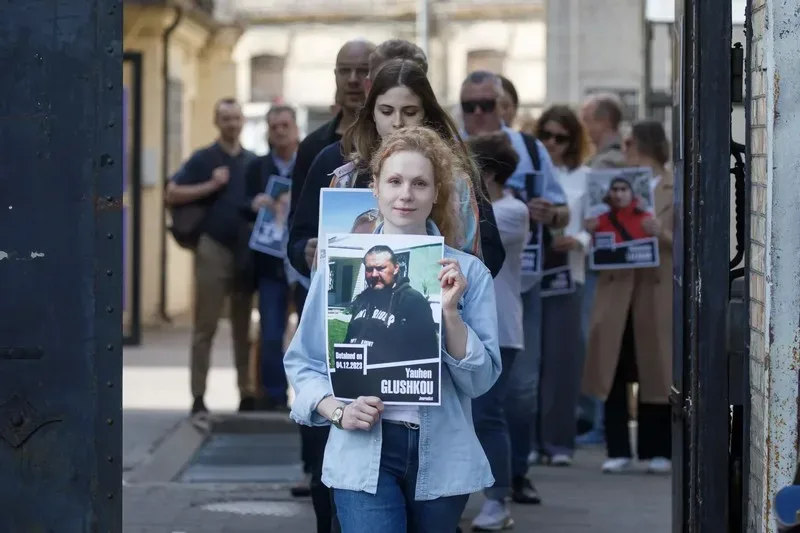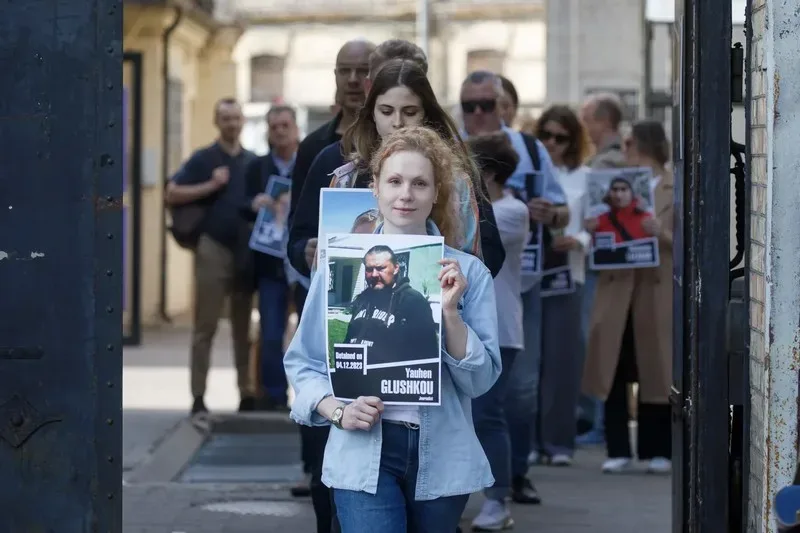“The tragic situation in the center of Europe should not be forgotten”. The Solidarity Marathon has already covered 23 countries worldwide
The international community continues to demand the release of Belarusian colleagues. The BAJ summarizes the interim results of the Solidarity Marathon, which has been ongoing for a year and four months.

The solidarity action with imprisoned journalists. Lukiškės Prison, Vilnius, May 3, 2024. Photo: BAJ
What has changed
The situation has not remained stagnant. A few months ago, 39 journalists were imprisoned. Since July 3, 2024, there have been four waves of pardons for political prisoners, with a total of 115 individuals released.
At least three imprisoned journalists were released by the Belarusian regime as part of these pardons:
- Kseniya Lutskina, a former journalist from “Belarus 2”, suffering from cancer, sentenced to 8 years in prison;
- Dzmitry Luksha, a correspondent for the Kazakh channel “Khabar24”, sentenced to 4 years in prison;
- Andrei Tolchyn, the founder of the city newspaper “Gomelskie Vedomosti”, sentenced to 2.5 years in prison.
Other journalists have also been released, but the reasons for their release could not be confirmed.
However, all of them were and are behind bars solely because they honestly fulfilled their professional duty, even in grim times when “sometimes there is no time for the law.”
The marathon continues in Europe, Canada, and even Australia
BAJ initiated the Solidarity Marathon to ensure the world does not forget about imprisoned Belarusian journalists. In the first half of the year alone, the campaign was supported by media professionals, human rights defenders, politicians, musicians, and directors from Lithuania, Germany, Scandinavian countries, and Australia.
On November 4, 2023, Belarusian lawyers in Prague marked the occasion with a photo session featuring portraits of imprisoned journalists. A training organized by the Council of Europe and the CEELI Institute (a non-governmental organization that promotes the rule of law) was taking place in the Czech Republic at that time.
Just two days later in Lviv, Ukraine, participants of the Astrozhskis Belarusian-Ukrainian Expert Forum concluded the event with a solidarity action for imprisoned media workers.
On November 9, the embassies of Ireland, Finland and Norway in Lithuania initiated a seminar in support of freedom for Belarusian media workers. Imprisoned journalists and their families received high-level support: Sviatlana Tsikhanouskaya, the Deputy Minister of Foreign Affairs of Lithuania Jonas Survila, and the Minister of European Affairs and Defense of Ireland Peter Burke traditionally held the portraits of imprisoned media representatives. Journalists, human rights defenders, and diplomats also joined the solidarity action.

Photo: BAJ
In the following days, the Solidarity Marathon traveled across continents: first, imprisoned Belarusian journalists were supported by human rights defenders in the UK, then solidarity actions were held in Bialystok, and later in Toronto, Canada.
A year later, the geography and list of participants significantly expanded
SWEDEN
At the beginning of March, the Art Museum in Malmö, Sweden, held the “Echoing the Voices of Women” action, which mentioned the political prisoners among Belarusian female journalists. With the support of the Belarusian Association of Journalists, Malmö PEN told the stories of nine media women who are currently behind bars and shared quotes from the final statement in court by Iryna Leushyna, editor-in-chief of the BelaPAN agency.

The event “Echoing the Voices of Women” received significant coverage in the Malmö press
Margareta Flygt read a passage from Iryna Leushyna’s final statement in court. A freelance journalist from Sweden, Åsa Ohlsson, who has worked hard to develop contacts between Belarusian and Swedish reporters, spoke about her politically imprisoned colleagues from Belarus.
SPAIN
On Freedom Day, Spain joined the Solidarity Marathon. On March 25, representatives of the Belarusian diaspora gathered in Barcelona, holding portraits of journalists currently in prisons.

Representatives of the Belarusian diaspora in Spain joined the Solidarity Marathon on March 25, 2024. Photo: from personal archive
— Today, Belarusians have been scattered around the world. Journalists and media representatives remain active individuals and play a significant role in the diasporas of the countries where they have found a new home, — explained Belarusians in Spain.
GERMANY
In mid-April, Berlin hosted a congress of the International Freedom of Expression Exchange (IFEX), which brings together more than 80 organizations from 60 countries. During the events in Berlin, colleagues from Africa called for the immediate release of imprisoned journalists in Belarus.

Journalists from Africa during the IFEX global network congress for freedom of expression in Berlin. April 2024. Photo: BAJ
LITHUANIA
On May 3, World Press Freedom Day, the Belarusian Association of Journalists and the Lithuanian Union of Journalists held a traditional action for the release of Belarusian political prisoners. The solidarity action took place in the Lukiškės Prison in Vilnius.
The organizers of the action held a symbolic photo session with portraits of imprisoned journalists. Iryna Leushyna, Maryna Zolatava, Ihar Losik, Andrei Kuznechyk, Ihar Karnei, Andrzej Poczobut, Andrei Aliaksandrau and others — at that moment, 35 journalists were behind bars in Belarus.
— The situation has not improved over the past year: when one journalist was released, others ended up in prison. We cannot yet achieve our main goal — the release of our colleagues. But we can remind everyone about our tragic situation, about Belarus, about Belarusian journalists in prison, and about all Belarusian political prisoners in general, — Andrei Bastunets, chairman of the Belarusian Association of Journalists, said at the meeting.
Dainius Radzevičius, chairman of the Lithuanian Union of Journalists, gave a brief historical overview of the place:
— Prisons in our region were built only by the Russian Empire. We have already freed ourselves: the Lukiškės Prison closed as a correctional facility in 2019. I hope Belarus will soon be freed as well and close its prisons.

Solidarity action with political prisoners among journalists. Lukiškės prison, Vilnius, May 3, 2024. Photo: BAJ
The participants of the action organized a symbolic release of Belarusian journalists: holding the portraits of imprisoned Belarusian journalists, they left Lukiškės Prison one by one through the entrance gate. They stepped out into free Vilnius.
KOSOVO
On May 24, the Congress of the European Federation of Journalists took place in Pristina. Leaders and representatives of journalistic unions and associations from the region participated in an action in solidarity with media representatives imprisoned in Belarus and Ukrainian journalists in Russian captivity.

The Solidarity Marathon with journalists behind bars was supported by participants of the EFJ Congress in Pristina. Kosovo, May 24, 2024. Photo: BAJ
— Ukrainian journalists in Russian captivity, like Belarusian media professionals, are hostages. Ukrainian colleagues were captured during the full-scale invasion of Russian troops, and many of them have been out of contact for a long time. Our hearts are with them and with Ukraine. Therefore, we immediately proposed to conduct this solidarity action together, — said Barys Haretski, BAJ Deputy Chairman, who represented BAJ at the EFJ Congress in Pristina.
LITHUANIA, Druskininkai
On September 14, the BAJ team participated in an International Journalists’ Football Tournament in Druskininkai.
Every year, partners of BAJ from the Lithuanian Union of Journalists and the Lithuanian Sports Journalist Association organize the tournament. This year, ten teams participated in the tournament. The BAJ team ultimately took the fifth place, once again reminding the world of their imprisoned Belarusian colleagues.

Druskininkai, September 14, 2024. Photo: BAJ
Andrei Bastunets: “We hope that our joint efforts are not in vain”
The interim results of the Solidarity Marathon were described by Andrei Bastunets, chairman of the Belarusian Association of Journalists, as compelling:
— People in countries where solidarity actions have already taken place now know about imprisoned Belarusian journalists, even though they might not have suspected before where this country, Belarus, is located.

Andrei Bastunets. Photo: BAJ
In Belarusian prisons, 33 independent media workers remain behind bars. This means that the campaign for solidarity and support continues:
— The very name of the campaign — Solidarity Marathon — indicates its long-term nature. We understand that it is not easy to achieve success and secure the quick release of Belarusian journalists. But it is critically important for us that our imprisoned colleagues are not forgotten, and that Belarusian society and the international community remember that they are in prison for freedom of expression. We hope that our joint efforts are not in vain, and that representatives of journalists’ unions in other countries will speak with their governments to exert pressure on the Belarusian authorities for the release of imprisoned journalists. Therefore, we will continue to remind everyone about the tragic situation in the heart of Europe, — emphasized Andrei Bastunets.
Just the numbers
Since the beginning of the Solidarity Marathon, 37 actions have taken place in 27 cities across 23 countries and on almost all continents. The persecution of Belarusian journalists is now known not only in Europe, Canada, and the United States, but also in Latin America, Australia, and in countries in Africa and Asia.
The Solidarity Marathon was joined by: the European Federation of Journalists (EFJ), the International Federation of Journalists (IFJ), the International Freedom of Expression Exchange (IFEX), Reporters Without Borders, the Danish Helsinki Committee, Index on Censorship, the Australian Media, Entertainment and Arts Alliance (MEAA), the Swedish PEN, and journalist unions from Lithuania, Sweden, Finland, and the Belarusian diasporas in various countries.
 @bajmedia
@bajmedia
